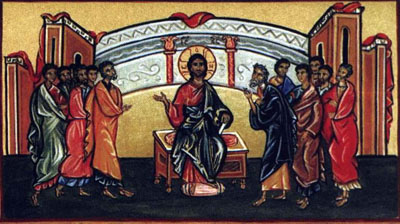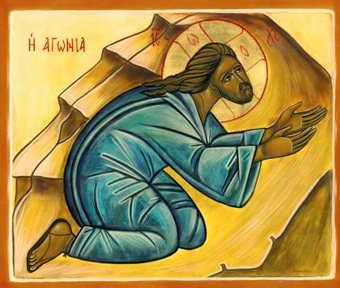For Sunday July 18, 2021
Lectionary Readings (Revised Common Lectionary, Year B)
2 Samuel 7:1-14a
Psalm 89:20-37
Ephesians 2:11-22
Mark 6:30-34, 53-56
In a New York Times article this past April, organizational psychologist Adam Grant identified the “dominant emotion of 2021” as “languishing.” He went on to describe this unfortunate state in a variety of ways: a sense of emptiness. Despondency. A lack of hope. Aimlessness and joylessness. The “dulling of delight” and the “dwindling of desire.”
At around the same time, researchers noted that roughly sixty percent of Americans are experiencing pandemic-related insomnia right now, despite the gains we’ve made in vaccinating our population, lowering nationwide mortality rates, and resuming some measure of normal life. In other words, what began over a year ago as a natural flight-or-fight response to a global state of emergency has now morphed into something shapeless and sinister. We’ve lost a sense of balance and rhythm. We can’t get started. We can’t wind down. We’re anxious, sleepless, overstimulated, and bored.
So I’m especially grateful for the lectionary this week, because it offers us a way out. A way out of our malaise, a way out of our inefficient striving, a way out of our culture’s soul-draining workaholism. Specifically, it offers us a portrait of Jesus we rarely consider. A Jesus who believes in rest.
When I read the Gospels, I tend to envision a brisk and efficient Messiah — full of purpose but short on time — striding from village to synagogue to hilltop to seaside, a whirlwind of miracles, parables, and life-changing conversations swirling around him. In fact, for most of my life, I have regarded Jesus as a sleepless zealot, striving to save the world before his clock runs down.
| |
But a high-strung workaholic is not who emerges in our Gospel reading this week. Instead, we find a Jesus who recognizes, honors, and tends to his own tiredness. We encounter a teacher who pulls his overheated disciples away from their labor and striving. We discover a savior who probes below the surfaces of our busyness, and pinpoints the hunger our manic culture won’t allow us to name: the hunger for space, reflection, solitude, nourishment, recreation, rest, and sleep.
Having spent a few days now with this lectionary, I wonder if the striving, hurrying Jesus I usually conjure in my head is really Jesus at all. Maybe he’s a distorted mirror image of me. My anxiety. My perfectionism. My dread of “wasting" time. My conflation of striving with virtue.
Our Gospel reading is an odd one this week, a disjointed cut-and-paste job that brackets Jesus's feeding of the five thousand to focus on the seemingly less spectacular events that precede and follow it. Mark 6:30-34 describes the return of the disciples from their first ministry tour — their inauguration into apostleship. We see them on fire, bursting with thrilling stories of the healings, exorcisms, and effective evangelistic campaigns they’ve pulled off on their own for the first time. They are wired. Excited. Caffeinated. Ready. In their minds, what they need is their next project from Jesus. Their next divine mission. In their minds, the crowds are waiting, and it's time to go.
But Jesus disagrees. Where the disciples see energy, Jesus sees overstimulation. Where the disciples see a tightly packed schedule, Jesus sees a poor sense of balance and rhythm. Where the disciples see invincibility, Jesus sees need. The need to debrief and reflect. The need to eat, pray, play, and sleep. The need to learn the art of solitude.
Perhaps Jesus senses that the disciples have darker stories to share with him, too — stories that will take time and tenderness to unearth. Stories of failure and rejection. Stories of doubt. Hard stories they need to process privately with their teacher. Whatever the case, Jesus recognizes that the disciples need a break. They're wired, tired, underfed, and in significant need of rest.
Jesus, meanwhile, is not in top form himself. He has just lost John the Baptist, his beloved cousin and prophet, the one who baptized him and spent a lifetime in the wilderness preparing his way. Worse, Jesus has lost him to murder, a terrifying reminder that God's beloved are not immune to violent, senseless deaths. Maybe Jesus's own end feels closer, and his own vocation seems more ominous. In other words, he has many reasons to feel heartbroken.
"Let's go off by ourselves to a quiet place and rest awhile," he says to his disciples as the crowds throng around them at the edge of the Sea of Galilee. "Come away with me," is how another translation puts it, and I hear both wisdom and love in these words. Jesus wants to provide a time of rest and recuperation for his friends. He wants to make sure that their zeal for ministry — for success in ministry — doesn’t become an idol. A drug. He wants to make sure that they value being more than doing.
 |
Lesson One for me? Pay more attention to the "throwaway" passages in the Gospels, those little transition verses which often precede or follow the "main events" of Jesus' life story. Passages like Luke 5:16: "But Jesus often withdrew to lonely places and prayed." Or Mark 11:12: "The next day as they were leaving Bethany, Jesus was hungry." Or Matthew 8:24: "Jesus was sleeping." Or Mark 7:24: "He didn't want anyone to know which house he was staying in."
In these "minor" verses, I see essential glimpses of Jesus's human life. His need to withdraw, his desire for solitary prayer, his physical hunger, his sleepiness, his inclination to hide. These glimpses take nothing away from Jesus's divinity; they enhance it, making it richer and all the more mysterious. They remind me that the doctrine of the Incarnation truly is Christianity's best gift to the world. God — the God of the whole universe — hungers, sleeps, eats, rests, withdraws, and grieves. In all of these mundane but crucial ways, our God is like us. Our God rests.
Of course, this lesson isn’t new; it runs through Scripture from its earliest pages. In Genesis, God rests on the seventh day, and calls the Sabbath holy for all future generations. Honoring this is no small feat in our 21st century lives, where every hour of every day is measured in profits gained or advantages lost. For me, rest never comes naturally. I forget about it. I fear it. I resist it. To remember that God rests, that Jesus rests, is startling and humbling. How dare I keep running on fumes when Jesus himself insists that his followers do otherwise? The Sabbath is the only thing in the creation account that God calls "holy." We would do well to pay attention.
 |
One of the most insidious social and cultural impacts of the Covid pandemic has been its blurring of the boundaries between home and work, rest and productivity. For some people, this has looked like the transforming of their homes into makeshift daycares, schools, nursing facilities, and professional workspaces all at once — just to meet the multigenerational demands of life under quarantine. For others, it has meant living 24/7 on Zoom, with no clear lines between the digital and the analog, the screen and the self. For others, it has meant losing income or work, or facing eviction, or watching loved ones die of Covid. No wonder we’re languishing. We’re not meant to live this way. We’re meant to “come away.” To honor the rhythms and borders of work and play, inside and outside, online and in-person, sleep and wakefulness. It’s not a coincidence that Jesus asks his disciples to leave the noise and crowds behind. Sometimes, we need deep silence. We need to unplug.
Fortunately, we follow a Savior who is unapologetic about his need for rest and solitude. Who sees no shame in retreating when he and his disciples need a break. Who does so even when the needs around him continue to press in on all sides.
Jesus is able to do this because he trusts God enough to let go. Even as he honors his vocation, and keeps his commitments, he doesn’t hoard the limelight, or allow his disciples to imagine that their faith makes them invincible. In the end, the work of the kingdom is God’s. We are precious and beloved, yes. But we’re not indispensable. God will survive our naps. It is more than okay to rest.
Debie Thomas: debie.thomas1@gmail.com
Image credits: (1) MonasteryIcons.com; (2) Pastor Daniel Hill's blog; and (3) PeteSantucci.com.



